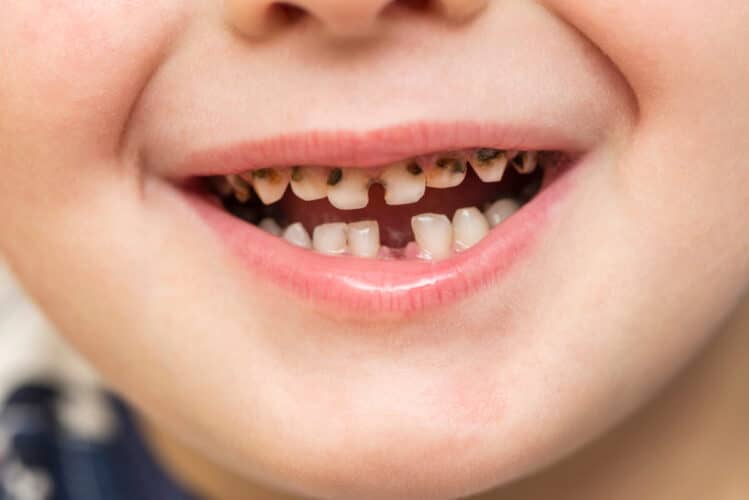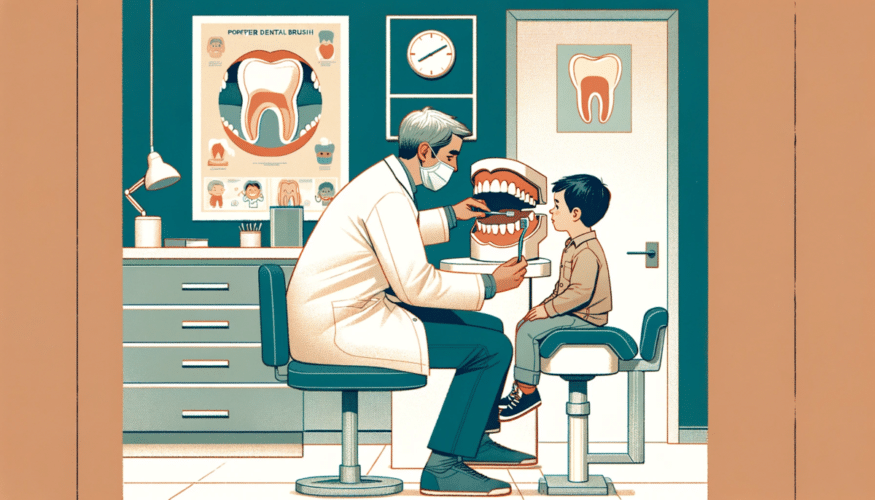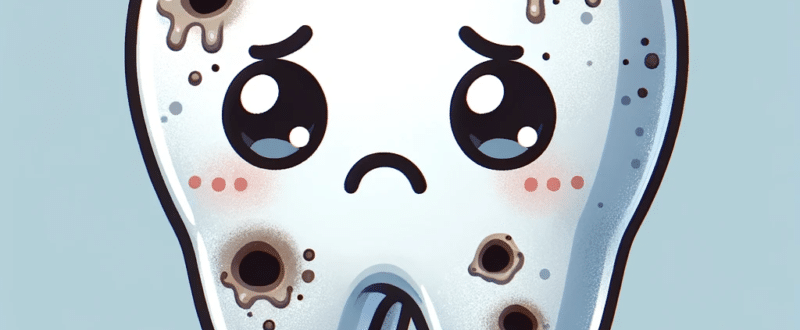Cavities in Children
Preventing Cavities in Children
When a first tooth appears in your child’s mouth, it marks the beginning of an important phase in dental health. Understanding how to prevent cavities in children is essential for their continued oral well-being.
Parents or caregivers must know the risks of tooth decay and dental caries in those precious baby teeth. Our team of specialist paediatric dentists is here to guide you through maintaining your child’s teeth and ensuring optimal oral health. Let’s work together to keep those little smiles bright and healthy!
 Dental Cavities in Children: What Every Parent Should Know
Dental Cavities in Children: What Every Parent Should Know
Dental cavities are a common issue for many children. They are small holes that develop on the tooth surface due to the damage caused by cavity-causing bacteria. These bacteria thrive in the mouth and can lead to early childhood caries, a type of decay found in young kids. It’s important for parents or caregivers to recognize that maintaining good dental health in their child’s early years is crucial for their baby’s teeth and future permanent teeth.
One of the main culprits behind cavities is dental plaque, a sticky substance that coats teeth. It’s formed when harmful bacteria in the mouth mix with sugars from the food we eat. This plaque can lead to decay if not properly cleaned off. The role that bacteria plays in tooth health is significant. Regular brushing and dental check-ups are key in controlling plaque buildup and preventing cavities. Early care for your child’s teeth sets the foundation for a lifetime of healthy smiles.
Spotting the Signs: Symptoms of Cavities in Children
Identifying the early signs of cavities is crucial in halting the tooth decay process. Here are some symptoms to look out for in the early stages:
White or light brown spots close to the gum line on the tooth surface.
Sensitivity or discomfort when consuming hot, cold, or sweet foods.
Visible holes or pits in the teeth.
Persistent bad breath or an unpleasant taste in the mouth.
Swelling or discomfort in the gums around a tooth.
It’s important to schedule regular visits with your kids dentist to detect these signs early and keep their teeth healthy. See Kids Dentist location on Brisbane Google Maps.
Causes of Cavities
Many people think that sugary foods and sugary drinks are the only causes of cavities, but there’s more to it. Tooth decay can affect both baby teeth and permanent teeth, and various factors contribute to this problem.
Each time your child eats, food particles can stick to their teeth, especially from starchy foods like bread and pasta. These particles, along with sugars from food and drinks, interact with bacteria in the child’s mouth, forming acids. These acids can erode tooth enamel, the hard outer layer of the teeth, and lead to dental caries.
Sticky foods and sports drinks also pose a higher risk for cavities. Foods that cling to the teeth give bacteria more time to produce harmful acids. Furthermore, frequent snacking without proper dental hygiene can increase the risk of tooth decay.
It’s not just about cutting down on sweets; it’s also about ensuring regular and thorough teeth cleaning, especially for toddler’s teeth. By understanding these causes, you can take better care of your child’s dental health and prevent cavities effectively.
 Preventive Measures to Prevent Cavities in Children
Preventive Measures to Prevent Cavities in Children
Preventing tooth decay in children is easier than you might think. It starts with establishing good dental hygiene habits early on. Regular brushing and flossing, along with the right dietary choices, play a crucial role. Incorporating these practices from the time the first tooth appears sets a solid foundation for preventing dental problems like tooth decay and gum disease.
The Role of Fluoride in Preventing Cavities in Children
Fluoride is a superhero when it comes to preventing cavities in children. From the moment the first tooth emerges, using fluoride toothpaste can significantly reduce the risk of cavities. For babies up to 18 months, a smear of fluoride toothpaste, about the size of a grain of rice, is enough. This tiny amount is perfect for keeping early childhood caries at bay.
As your child grows, from 18 months to 6 years, increase the toothpaste to a pea-sized amount of low-fluoride variety. This ensures children younger than 3 years old get the right fluoride level.
Over 6 years old, children can transition to regular fluoride toothpaste. This change meets their evolving dental needs, providing more fluoride for growing teeth.
Remember, it’s important to supervise them to make sure they’re brushing correctly and not swallowing the toothpaste. Make sure you do not expose baby teeth to too much fluoride, as it may increase the risk of dental fluorosis.
Brushing and Flossing: The Daily Defense Against Cavities
Flossing and brushing are the daily warriors in the battle against tooth decay. Teaching your child to brush their teeth twice a day with fluoride toothpaste is a crucial step in good dental hygiene. Parents or caregivers should start brushing their children’s teeth as soon as the first tooth appears in the child’s mouth.
For the best results, use a soft toothbrush and ensure they cover all surfaces of the teeth. Flossing is equally important; using dental floss helps remove food particles and plaque from between the teeth where a toothbrush can’t reach. Encourage your child to floss daily. This habit not only protects their baby tooth but also sets them up for a lifetime of healthy teeth.
Sealants: An Extra Layer of Protection for Your Child’s Teeth
Dental sealants offer an additional shield for your child’s teeth. Dental sealants are applied to the chewing surfaces of the back teeth – where most cavities form. Sealants block out cavity-causing bacteria and food, enhancing protection against tooth decay. They are particularly effective for older children who might struggle with maintaining perfect brushing habits.
Prevent Tooth Decay by Healthy Diet
A nutritious diet is not just good for the body; it’s also an essential factor to prevent tooth decay. What we eat and drink has a significant impact on oral health, especially for young children. Swapping out sugary drinks for drinking water, preferably tap water that is often fluoridated, can make a big difference. Water helps to wash away food particles, supports saliva flow, and doesn’t add any extra sugar to your child’s diet.
Your pediatric dentist will agree that a balanced diet is crucial for dental health. Encourage your child to eat a variety of fruits, vegetables, lean proteins, and whole grains. These foods not only provide essential nutrients but also help in maintaining strong, healthy teeth and gums. Remember, a healthy diet is a key to a happy, cavity-free smile!
Protect Baby Teeth by Regular Dental Check-Ups
Regular dental check-ups are essential in maintaining your baby’s teeth. Starting from a young age, visits to the dentist help in monitoring the development of their teeth and catching any signs of decay early. A child’s dentist can also apply fluoride varnishes to strengthen the enamel and offer advice on good dental habits. Even before your baby’s teeth have all come in, these check-ups are vital in ensuring their future oral health.
 Pure Dentistry: Your Partner in Oral Health
Pure Dentistry: Your Partner in Oral Health
At Pure Dentistry, we’re committed to providing exceptional care for your entire family’s dental needs. Our team specializes in treating cavities and offering comprehensive dental treatment solutions. We understand the unique challenges that young children face in maintaining oral health and are equipped to prevent tooth decay effectively with treatments like fluoride varnish.
Moreover, we’re proud to offer specialized services like sleep dentistry and happy gas, ideal for children with severe dental phobia. These options ensure a comfortable, anxiety-free experience for our young patients. Trust us to be your partner in oral health, offering a warm, welcoming environment where every smile matters. You can contact us by calling 07 3343 4869.





































